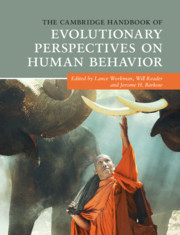Book contents
- The Cambridge Handbook of Evolutionary Perspectives on Human Behavior
- The Cambridge Handbook of Evolutionary Perspectives on Human Behavior
- Copyright page
- Dedication
- Contents
- Figures
- Tables
- Contributors
- Preface
- Acknowledgments
- Part I The Comparative Approach
- Part II Sociocultural Anthropology and Evolution
- 4 Eusociality in Humans
- 5 The Nature and Psychological Foundation of Social Universals
- 6 The Study of Culture and Evolution across Disciplines
- Part III Evolution and Neuroscience
- Part IV Group Living
- Part V Evolution and Cognition
- Part VI Evolution and Development
- Part VII Sexual Selection and Human Sex Differences
- Part VIII Abnormal Behavior and Evolutionary Psychopathology
- Part IX Applying Evolutionary Principles
- Part X Evolution and the Media
- Index
- References
5 - The Nature and Psychological Foundation of Social Universals
from Part II - Sociocultural Anthropology and Evolution
Published online by Cambridge University Press: 02 March 2020
- The Cambridge Handbook of Evolutionary Perspectives on Human Behavior
- The Cambridge Handbook of Evolutionary Perspectives on Human Behavior
- Copyright page
- Dedication
- Contents
- Figures
- Tables
- Contributors
- Preface
- Acknowledgments
- Part I The Comparative Approach
- Part II Sociocultural Anthropology and Evolution
- 4 Eusociality in Humans
- 5 The Nature and Psychological Foundation of Social Universals
- 6 The Study of Culture and Evolution across Disciplines
- Part III Evolution and Neuroscience
- Part IV Group Living
- Part V Evolution and Cognition
- Part VI Evolution and Development
- Part VII Sexual Selection and Human Sex Differences
- Part VIII Abnormal Behavior and Evolutionary Psychopathology
- Part IX Applying Evolutionary Principles
- Part X Evolution and the Media
- Index
- References
Summary
Absolute universals are behavior-related phenomena present in all societies. They comprise two broad classes: psychological universals (e.g., emotional and cognitive processes) and behavioral universals, which are categories containing a large number of cultural forms (e.g., techniques and social activities). Although a number of studies have focused on the nature of psychological and behavioral universals, very little is known about how the two classes relate to each other. In this chapter, I present a model of the processes involved in how psychological universals generate social universals, a large and highly diversified subset of behavioral universals. Social universals are classified into 10 categories, forming a multilevel hierarchical structure whose most elementary components are represented by individual social acts. The model posits that psychological adaptations (evolved psychological mechanisms) are fundamental mechanisms regulating social life and that therefore they must play a central role in the production of the most basic categories of social universals, including individual social acts. The model shows that even assuming that psychological adaptations aim at fulfilling rather broad functional objectives (e.g., attaining status, acquiring sexual partners), they nonetheless produce a substantial number of specific categories of individual social acts through interactions between three sets of factors: (1) the adaptation’s genetically specified subgoals (called systemic social motives); (2) the universal categories of socioecological contexts eliciting those motives; and (3) the universal cognitive mechanisms available for achieving them. This results in psychological adaptations deploying into a large array of universal social propensities. The latter in turn would bias creativity (innovation) and social learning and operate as templates for the production and adoption of cultural variants congruent with the propensities; that is, they would generate culturally polymorphic categories of social acts. Even though absolute universals provide strong evidence that human nature, through the intermediary of psychological adaptations, produces a large number of specific social patterns, they constitute only a tiny fraction of the cross-cultural behavioral regularities governed by human nature.
- Type
- Chapter
- Information
- Publisher: Cambridge University PressPrint publication year: 2020
References
- 1
- Cited by

